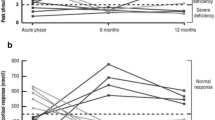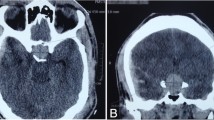Abstract
Hypopituitarism is a common complication of TBI in long-term survivors, more frequent than previously realized. It may be partial or complete, sometimes very subtle without visible lesions in hypothalamo-pituitary region and is diagnosed only by biochemical means. Neuroendocrine abnormalities caused by TBI may have significant implications for the recovery and rehabilitation of these patients. The subjects at risk are those who have suffered moderate to severe trauma, although mild intensity trauma may precede hypopituitarism also. Particular attention should be paid to this problem in children and adolescents. We describe a patient with hypopituitarism thought to be idiopathic due to mild head trauma which caused diabetes insipidus in childhood, gradual failure of pituitary hormones during the period of growth and development, and metabolic (dyslipidemia), physical (obesity), and cognitive impairments in the adult period.



Similar content being viewed by others
References
D. Kelly, I. Gonzalo, P. Cohan, N. Berman, R. Swerdloff, C. Wang, J. Neurosurg. 93, 743–752 (2000)
S. Benvenga, A. Campenni, R.M. Ruggeri, F. Trimarrchi, J. Clin. Endocrinol. Metabol. 85, 1353–1361 (2000)
S.A. Lieberman, A.L. Oberoi, C.R. Gilkinson, B.E. Masel, R.J. Urban, J. Clin. Endocrinol. Metabol. 86, 2752–2756 (2001)
G. Aimaretti, M.R. Ambrosio, C. Di Somma, A. Fusco, S. Cannavo, M. Gasperi, C. Scaroni, L. De Marinis, S. Benvenga, E.C.D. Uberti, G. Lombardi, F. Mantero, E. Martino, G. Giordano, E. Ghigo, Clin. Endocrinol. 61, 320–326 (2004)
M.D.E. Bondanelli, L. Marinis, M.R. Ambrosio, M. Monesi, D. Valle, M.C. Zatelli, A. Fusco, A. Bianchi, M. Farneti, E.C. degli Uberti, J. Neurotrauma 21, 685–696 (2004)
V. Popovic, S. Pekic, D. Pavlovic, N. Maric, M. Jasovic-Gasic, B. Djurovic, M. Medic-Stojanoska, V. Zivkovic, M. Stojanovic, M. Doknic, N. Milic, M. Djurovic, C. Dieguez, F.F. Casanueva, J. Endocrinol. Invest. 27, 1048–1054 (2004)
A. Leal-Cerro, J.M. Flores, M. Rincon, F. Murillo, M. Pujol, F. Garcia-Pesquera, C. Dieguez, F.F. Casanueva, Clin. Endocrinol. 62, 525–532 (2005)
A. Agha, B. Rogers, D. Mylotte, F. Taleb, W. Tormey, J. Philips, C. Thompson, Clin. Endocrinol. 60, 584–591 (2004)
F. Tanriverdi, H. Senyurek, K. Unluhizarci, A. Selcuklu, F.F. Casanueva, F. Kelestimur, J. Clin. Endocrinol. Metabol. 91, 2105–2111 (2006)
S. Benvenga, T. Vigo, R. Ruggeri, D. Lapa, B. Almoto, F. LoDuidice, M. Longo, A. Blandino, A. Campenni, S. Cannavo, F. Trimarchi, Am. J. Med. 116, 767–771 (2004)
Growth Hormone Research Society: consensus guidelines for the diagnosis and treatment of adults with growth hormone deficiency: summary statement of the growth hormone research society workshop on adult growth hormone deficiency, J. Clin. Endocrinol. Metabol. 83, 379–381 (1998)
Growth Hormone Research Society Critical evaluation of the safety of recombinant human growth hormone administration: statement from the Growth Hormone Research Society, J. Clin. Endocrinol. Metabol. 86, 1868–1870 (2001)
G. Aimaretti, B. Bellone, L. Di Vito, G. Corneli, E. Arvat, I. Benso, F. Camanni, E. Ghigo, J. Clin. Endocrinol. Metabol. 85, 3693–3699 (2000)
F. Kelestimur, V. Popovic, A. Leal, P.S. Van Dam, E. Torrens, L.F. Perez Mendez, Y. Greenman, P.F.H. Koppeschaar, C. Dieguez, F.F. Casanueva, Clin. Endocrinol. 64, 667–671 (2006)
E. Ghigo, H.G. Aimaretti, L. Gianotti, J. Bellone, E. Arvat, F. Cammani, Eur. J. Endocrinol. 134, 352–356 (1996)
V. Popovic, A. Leal, D. Micic, H.P.F. Kooppeschaar, E. Torrens, C. Paramo, S. Obradovic, C. Dieguez, F.F. Casanueva, Lancet 356(9236), 1137–1142 (2000)
K.K.Y. Ho, Lancet 356(9236), 1125–1126 (2000)
V. Popovic, S. Pekic, M. Doknic, D. Micic, S. Damjanovic, M. Zarkovic, G. Aimaretti, G. Corneli, E. Ghigo, C. Dieguez, F.F. Casanueva, Clin. Endocrinol.0 59, 251–257 (2003)
V. Popovic, Pituitary 8, 239–243 (2005)
J. Cain, G. Williams, R. Dluhy, Can. Med. Assoc. J. 107, 617–622 (1972)
D. Hoffman, A. O’Sullivan, R. Baxter, K. Ho, Lancet 343, 1065–1068 (1994)
J.O. Jorgensen, J.S. Christiansen, Clin. Endocrinol. 58, 18–19 (2003)
A. Agha, C.J. Thompson, Pituitary 8, 245–249 (2005)
A. Agha, C.J. Thompson, Clin. Endocrinol. 64, 481–488 (2006)
M.O. van Aken, S.W.J. Lamberts, Pituitary 8, 183–191 (2005)
J. Springer, A. Chollet, Lancet 357, 1848 (2001)
Author information
Authors and Affiliations
Corresponding author
Rights and permissions
About this article
Cite this article
Medic-Stojanoska, M., Pekic, S., Curic, N. et al. Evolving hypopituitarism as a consequence of traumatic brain injury (TBI) in childhood—call for attention. Endocr 31, 268–271 (2007). https://doi.org/10.1007/s12020-007-0037-4
Received:
Revised:
Accepted:
Published:
Issue Date:
DOI: https://doi.org/10.1007/s12020-007-0037-4




